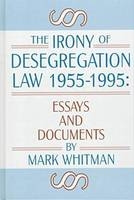
The Irony of Desegregation, 1955-95
Essays and Documents
Seiten
1997
Markus Wiener Publishing Inc (Verlag)
978-1-55876-119-3 (ISBN)
Markus Wiener Publishing Inc (Verlag)
978-1-55876-119-3 (ISBN)
An interpretative analysis of US desegregation law between 1955 and 1995. It explores major cases that offer a context for viewing and understanding the significance of the decisions, how they were arrived at, and how they changed precedent. It follows on from ""Removing a Badge of Slavery"".
This volume continues the story begun in the author's earlier work, Removing a Badge of Slavery. It seeks to provide an interpretative history of the major developments in school desegregation law in America beginning with the case of Brown II. Such a study cannot avoid struggling with the question of whether these developments have not been circular and self-defeating in nature. From a requirement in the 1950s and early 1960s that school systems guilty of illegal segregation provide only for a non-discriminatory arrangement of their schools, the Supreme Court moved to the requirement, by the 1970s, that such systems must be integrated. But the diffuse and uncertain constitutional declarations which justified this requirement seem unable to sustain the transformation in American education they wrought. This volume attempts to explore, and hopefully to illuminate ,the twisting path of American desegregation law. It suggests they may be slipping back, both in theory and practice, to a new apartheid.
This volume continues the story begun in the author's earlier work, Removing a Badge of Slavery. It seeks to provide an interpretative history of the major developments in school desegregation law in America beginning with the case of Brown II. Such a study cannot avoid struggling with the question of whether these developments have not been circular and self-defeating in nature. From a requirement in the 1950s and early 1960s that school systems guilty of illegal segregation provide only for a non-discriminatory arrangement of their schools, the Supreme Court moved to the requirement, by the 1970s, that such systems must be integrated. But the diffuse and uncertain constitutional declarations which justified this requirement seem unable to sustain the transformation in American education they wrought. This volume attempts to explore, and hopefully to illuminate ,the twisting path of American desegregation law. It suggests they may be slipping back, both in theory and practice, to a new apartheid.
Mark Whitman is professor of history at Towson State University.
| Erscheint lt. Verlag | 31.10.1997 |
|---|---|
| Verlagsort | Princeton |
| Sprache | englisch |
| Themenwelt | Geschichte ► Allgemeine Geschichte ► Zeitgeschichte |
| Geisteswissenschaften ► Geschichte ► Regional- / Ländergeschichte | |
| Recht / Steuern ► Arbeits- / Sozialrecht ► Sozialrecht | |
| Recht / Steuern ► EU / Internationales Recht | |
| Recht / Steuern ► Öffentliches Recht ► Besonderes Verwaltungsrecht | |
| Sozialwissenschaften ► Politik / Verwaltung | |
| ISBN-10 | 1-55876-119-5 / 1558761195 |
| ISBN-13 | 978-1-55876-119-3 / 9781558761193 |
| Zustand | Neuware |
| Haben Sie eine Frage zum Produkt? |
Mehr entdecken
aus dem Bereich
aus dem Bereich
Gewalt, Umwelt, Identität, Methode
Buch | Softcover (2024)
Spector Books OHG (Verlag)
CHF 49,95
wie Freud im Kollektiv verschwand
Buch | Hardcover (2024)
Klett-Cotta (Verlag)
CHF 34,95


